|
|
|
Sort Order |
|
|
|
Items / Page
|
|
|
|
|
|
|
| Srl | Item |
| 1 |
ID:
086494
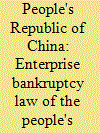

|
|
|
|
|
| Publication |
2009.
|
| Summary/Abstract |
This law is formulated in order to suit the development of a planned socialist commodity economy and the needs of the economic structure, to promote the autonomous operation of enterprises owned by the whole people,to strengthen the economic responsibility system and democratic management, to improve the state of operation, to increase economic efficiency, and to protect the lawful rights and interests of creditors and debtors.
|
|
|
|
|
|
|
|
|
|
|
|
|
|
|
|
| 2 |
ID:
168571
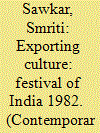

|
|
|
|
|
| Summary/Abstract |
This article employs the concept of culture as a consumable resource in visually-mediated global markets. The Festival of India, first hosted in 1982 in Britain, was a unique state-sponsored spectacle that packaged Indian culture as a commodity for Western audiences. Indira Gandhi as Prime Minister took keen interest in the ‘visual scheme’ of India that was projected during the Festival, simultaneously conscious of her own image as she returned to power after the contentious rule of the ‘Emergency’. The article suggests that Gandhi sought to divert negative media attention on her regime by putting on display India’s ‘soft power’ in artistic and scientific fields. It further comments upon the diversity in the reception of the event by various audiences thereby challenging the notion of passivity often attributed to consumers of cultural performance. By examining how Gandhi and her advisors used culture as something ‘exportable’ to remake her image, the article seeks to place the Festival alongside similar spectacles staged in the early 1980s when Gandhi’s leadership faced a crisis of legitimacy, both at home and abroad.
|
|
|
|
|
|
|
|
|
|
|
|
|
|
|
|
| 3 |
ID:
121672
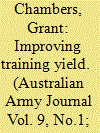

|
|
|
|
|
| Publication |
2012.
|
| Summary/Abstract |
Field training time in the Australian Army is a precious commodity. It is also unlikely to
increase in the near future. Fighting echelon units must examine ways of improving their
training yield if they are to improve their combat effectiveness. This paper examines three
ways that fighting echelon units can improve their training yield. First, by using regimental
training to turn their junior leaders into better collective trainers. Second, by using early
evaluation of whole-task training to improve training efficiency. Third, by increasing the
objectivity of training evaluation. Cognisant of the resource constraints facing units today,
the paper aims to offer pragmatic options that do not simply demand doing more with less.
Where options requiring greater effort are detailed, the costs are made clear, but so are
the benefits.
|
|
|
|
|
|
|
|
|
|
|
|
|
|
|
|
| 4 |
ID:
147456
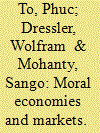

|
|
|
|
|
| Summary/Abstract |
Vietnam's uplands have been increasingly integrated into commodity production for global markets. This paper focuses on the role of the cassava trader in connecting upland villagers as cassava producers to an emerging global cassava market. In Vietnam's Central Highlands, ethnic minority villagers engaging in a mixed economy of subsistence and cash crop production still practice communal resource use and reciprocal labour arrangements – customs associated with the (contested) notion of ‘moral economy’. In this context, traders have strategically traversed the insider–outsider divide, enlisting trust and reciprocity to extend the patron–client relationship between traders and villagers. In the absence of state support for upland communities, these traders have embedded themselves within village social relations through the provision of multiple goods and services, including loans. Villagers turn to these traders during times of hardship through degrees of mutual dependence in often unequal trade relations. The ‘benevolence’ of the traders, however, is an explicit strategy to legitimise their economic benefits. The relationship is deepened because traders fill a vacuum in state services by providing technical support to farmers cultivating cassava. Beyond benefiting themselves, in their status as community ‘insiders’, traders promote market penetration into the uplands with associated social and environmental implications.
|
|
|
|
|
|
|
|
|
|
|
|
|
|
|
|
| 5 |
ID:
182842
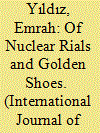

|
|
|
|
|
| Summary/Abstract |
Since the 2012 sanctions that dis-embedded the Iranian economy from global markets, contraband commerce has become an explosive issue in Iran. Increasingly Iranians came to regard sanctions as enforced by both international powers and their own state officials, who criminalized certain kinds of cross-border trade, but not others. Although Iranian state actors distinguish between the trader—praised for contributing to the economy—and the traitor—denounced for undermining its integrity—what both unites and blurs the line between them is their shared struggle with a devaluing currency that some Iranians call nuclear. This article examines the “nuclear rial” by extending insights from anthropological scholarship on money to the study of sanctions to advance a dynamic understanding of currency. Studying Iranian trade in gold proves productive for understanding how people negotiate the effects of sanctions in an unevenly financialized world. At stake in the negotiations is a conditional articulation of monetary value that relies on contingent conversions between commodities and currencies and among currencies.
|
|
|
|
|
|
|
|
|
|
|
|
|
|
|
|
| 6 |
ID:
189545
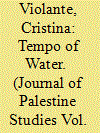

|
|
|
|
|
| Summary/Abstract |
During the Mandate period, Palestinian rural communities often shared their water sources proportionally in time-based rotations. Water use functioned as a temporal marker, embedded in the tempo of daily life. This article contrasts this way of distributing water with that of Zionist settlers and the British Mandatory administration, which typically measured water use in terms of volume. Volume-based measures, used by the British and by Zionist settlers, facilitated the commodification of water, transforming it into an object of investment for the development of colonial infrastructure, most notably irrigation and electricity. Time-based rotations, in contrast, were anchored in the movement of the sun and planets, seasonality (dry vs. wet season), and the needs of the community as a whole. The two approaches reflect different ways of relating to the environment and the natural world. Therefore, Zionist dispossession of water resources was not merely material, but it disrupted communal practices and obscured their associated temporalities.
|
|
|
|
|
|
|
|
|
|
|
|
|
|
|
|
|
|
|
|
|